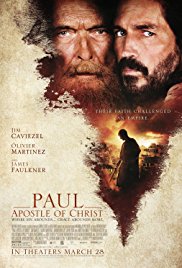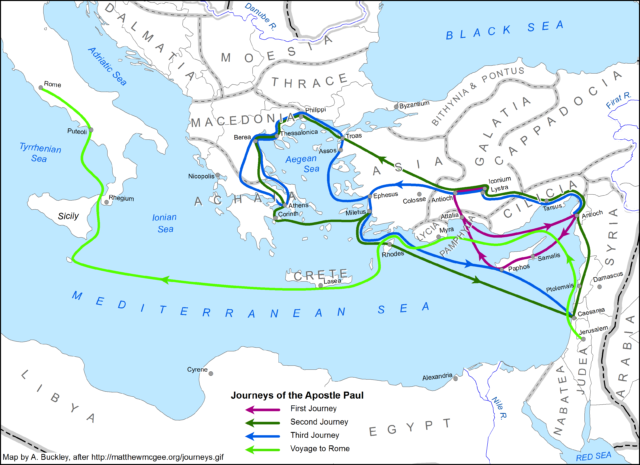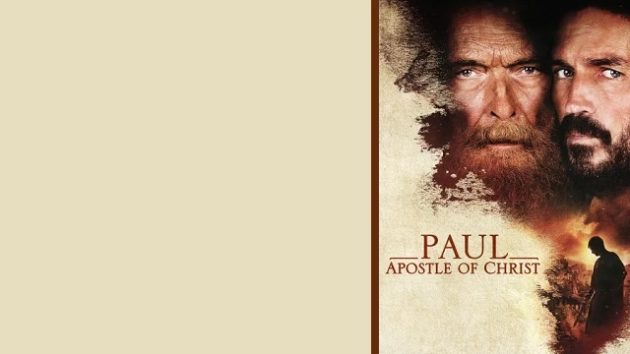Paul, Apostle of Christ: Ancient Rome is a grim reflection of Today’s World
I went to see the film “Paul, Apostle of Christ.”
The film is about the Bible’s Acts of the Apostles, the second book written by Saint Luke, which serves as a sequel to the Gospel of St. John and precedes the Letter of St. Paul to the Romans in the New Testament. John Mulderig from Catholic News Service notes:
In the long history of the church, perhaps no partnership has been more consequential than that between St. Paul the Apostle and his disciple, St. Luke.
Between them, they account for at least 15 of the 27 books of the New Testament, and Luke accompanied Paul on some of the journeys during which the Apostle to the Gentiles sowed the seeds of faith across the Roman Empire.
 The film dramatically presents three “F’s”: Faith in God, faith in the family and the faith in the church.
The film dramatically presents three “F’s”: Faith in God, faith in the family and the faith in the church.
Paul, Luke and others’ of the faith in Jesus, the Son of God, are tested. The family of husband and wife Aquila and Priscilla. And finally the faith of the church community in Rome in A.D. 64 under Imperator Nero Cladius Divi Claudius filius Caesar Augustus Germanicus.
This film is relevant today. Why?
Faith in God, faith in the family and faith in the church are under siege!
Emilie Kao, Director of the Richard and Helen DeVos Center for Religion & Civil Society at The Heritage Foundation, in a column titled “Americans Grapple With Evil Amid Decline in Religious Faith” wrote:
In 2014, a Pew study found that 23 percent of Americans considered themselves “nones” (atheist, agnostic, or “nothing in particular”). Sunday school, once a staple of childhood for many Americans, is becoming a thing of the past.
The one area of the supernatural that now attracts the millennial generation’s interest is the occult. Spurred on by the hyper-connected world of social media, occult trends like the Charlie Charlie game are fueling a “witchcraft renaissance.”
Obsession with the fictional horror character Slender Man even led two 12-year-old girls in Wisconsin to brutally stab their classmate.
As Michelle Goldberg writes in The New York Times, “Often when traditional institutions and beliefs collapse and people are caught between cultural despair and cosmic hopes, they turn to magic.” Self-described witch Dakota Bracciale says of the collapse of traditional religions, “It left this huge vacuum, and that vacuum had to be filled with something.”
New York Magazine columnist Andrew Sullivan points to the spiritual vacuum as the source of the opioid crisis. “Even as we near peak employment and record-high median household income, a sense of permanent economic insecurity and spiritual emptiness has become widespread.”
Similarly, Nobel Prize winner Angus Deaton and Princeton University economist Anne Case attribute the rising suicide rate to the declining spiritual health of white, middle-aged men. If adults are finding it harder to cling to self-control, sanity, and life itself, is it any wonder that an unprecedented number of youth are finding it harder and harder to get through their teenage years?
Professor emeritus of psychology at New York University Paul Vitz attributes teens’ skyrocketing anxiety, self-harm, suicides, and school shootings to their poor spiritual health. Despite being born into a world with more material comforts and mental health resources than ever, the next generation seems increasingly drawn toward self-destruction.
Vitz observes that without belief in objective truth, goodness, and beauty, including the belief that they are created in the image of God, the next generation clings to external sources of identity: social media, sexual experiences, and material possessions.
In a sea of ever-changing cultural and social trends, such flimsy sources of meaning can predictably leave some of them bewildered and overwhelmed. “Countless young people … feel there is nothing for them to believe in,” he writes. “Emotional numbness is one of the consequences. They … no longer find self-worth in their efforts to lead lives based on truth and love.”
Vitz proposes that Americans re-examine the value of faith and its power to help people live happier, healthier, and longer lives. [Emphasis added]
Ancient Rome is a reflection of the world today
As it was during the time of Nero we see history repeating itself. Christians are still being persecuted. Families are still being tested by the evils in the world outside. People are still being crucified and burned alive. Hundreds of thousands of men, women, children and the unborn are being slaughtered globally. Hate and revenge have replace love and compassion in the hearts of mankind.
But their is an answer. An answer that has always been there for mankind. Kao ends with this, “Sullivan writes that our country will not overcome its demons until we resolve the deeper problems that have led to the breakdown of faith, family, and community.”
The answer is FAITH in the Lord Jesus Christ. That is the message given in “Paul, Apostle of Christ.”
As George Michael said in the lyrics to his hit song “Faith”:
‘Cause I’ve gotta have faith
Unh I gotta faith
Because I gotta to have faith, faith, faith
I gotta to have faith, faith, faith
Faith in God and in his son Jesus. Faith in our family and finally faith in the Church, which resides in the hearts and souls of each of us.
EDITORS NOTE: Below is a map of the four journeys of St. Paul as he spread the word of Jesus to the four corners of the earth.




Leave a Reply
Want to join the discussion?Feel free to contribute!